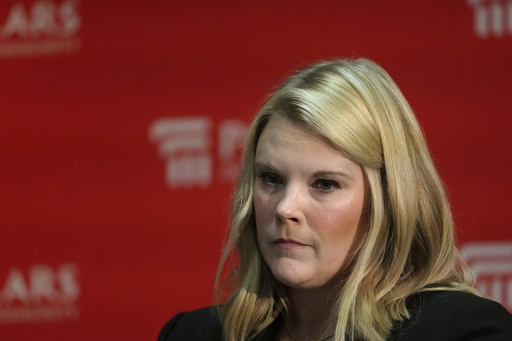
The Wisconsin Supreme Court is set to hear crucial arguments that may influence the future of the state’s top election official, Meagan Wolfe, who has faced intense scrutiny from Republican lawmakers. These officials have been promoting unfounded conspiracy theories surrounding the elections, which have led to efforts to remove Wolfe from her position.
Last year, following the Republican-led initiative to dismiss her, the Wisconsin Elections Commission took legal action to protect Wolfe’s role, asserting that the lower court’s ruling in her favor should stand. This would ensure that she could continue her duties without needing confirmation from the state Senate.
On the opposing side, Republican legislators argue that the commission must appoint either Wolfe or another candidate so that the Senate can conduct a confirmation vote. They maintain that Wolfe should not remain in her position as a holdover official.
Wolfe was initially appointed to the nonpartisan role in 2018 and received Senate confirmation for a four-year term in 2019 when Republicans held a majority. The commission operates under a bipartisan board that consists of equal representation from both parties, with Wolfe leading the nonpartisan staff.
Republican dissatisfaction with the 2020 presidential election outcome, which saw Joe Biden win in Wisconsin, fueled attempts to oust Wolfe. While Trump claimed victory in the state in 2016 and again in the most recent election, his supporters did not claim widespread fraud this time around.
During her tenure, Wolfe has faced baseless allegations from election deniers who wrongly accused her of being involved in a scheme to manipulate the 2020 election results in favor of Biden. Biden’s victory was confirmed by a margin of nearly 21,000 votes, despite several recounts and a conservative legal examination.
In 2023, the commission unanimously expressed support for Wolfe’s reappointment. Out of the six commission members, three Republicans voted in favor, while three Democrats abstained, resulting in a tie. If one additional vote of support had been cast, her nomination would have proceeded to the Senate for potential confirmation.
Despite the absence of a reappointment process moving forward, Republican senators voted in September 2023 to terminate Wolfe’s role, which encountered pushback from Democrats and the nonpartisan attorneys in the Legislature. The latter group argued that the Senate lacked the authority for such a vote given Wolfe’s status as a holdover.
In response, the commission filed a lawsuit to contest this Senate decision. Subsequently, Republican leaders modified their stance in court, stating that their vote to remove Wolfe was merely symbolic with no legal standing.
The Republicans are urging the judge to mandate that the elections commission appoint a new administrator for Senate confirmation. However, in a 2023 decision, Dane County Circuit Court Judge Ann Peacock ruled that as a holdover, Wolfe could continue serving in her role due to the commission’s failure to secure a majority support for her appointment. Peacock stated that the Senate’s vote to remove Wolfe bore no legal weight, and the commission was under no obligation to seek a new leader while she remained in her position.
The leaders of the legislature have since appealed, and the state Supreme Court’s upcoming hearings will pave the way for a decision that could arise in the forthcoming weeks or months.
After the recent election, Wolfe was inquired about her future plans during a press conference, specifically regarding her commitment to her role long-term. Though she refrained from making any guarantees, she emphasized her focus on ensuring the election certification was completed.
The state Senate is responsible for voting on approvals for appointments like Wolfe’s. However, the Republican majority will see a decrease from 22-11 to 18-15 post-election, meaning they can afford to lose only one vote to maintain their majority.
